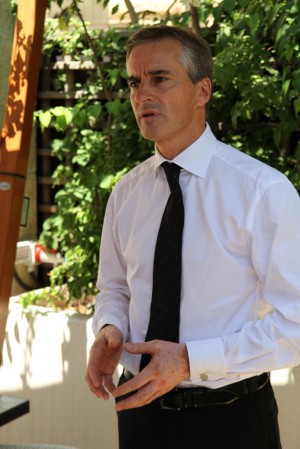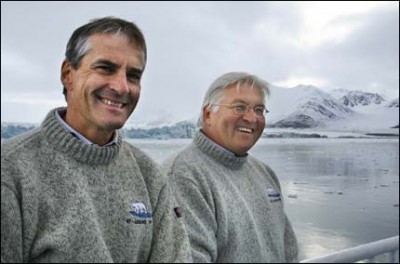NEWS ANALYSIS: New Labour Party boss Jonas Gahr Støre has suddenly emerged as the new ray of hope for the environmental movement and a threat to Norway’s oil and gas industry. Remarks he’s made in the past few weeks suggest that he wants to slow the pace of oil exploration and extraction.

The Labour Party has always tried to promote an environmentally conscious image, but when it comes to the oil and gas industry, the jobs that it creates have seemed to weigh more heavily than environmental and climate concerns. That’s why Labour, to the disappointment of environmentalists and many in the tourism and fishing industries, refused to take a firm stand against oil and gas exploration off scenic Lofoten when it led the former left-center government. While Støre’s predecessor Jens Stoltenberg flew around the world encouraging other countries to cut their carbon emissions, he wouldn’t commit to halting more oil and gas exploration and production at home. Ongoing job creation was more important, and it was only for the sake of government unity with its two more environmentally oriented coalition partners that Lofoten ultimately remained off-limits to the oil companies, at least for now.
Now Støre is leading the Labour Party, and he seems to be opting for a different approach. Backed by concerns that Labour lost much of the environmental vote in last year’s parliamentary elections, Labour first formed a majority in Parliament last winter that forced the government to demand faster electrification of new offshore oil fields at Utsira being developed by state-controlled Statoil and its partners. Then Labour called on Norway’s oil fund to sell off its stakes in coal companies.
Things literally warmed up during the summer, when Støre, after taking on his new post, addressed members of Labour’s youth organization AUF at their summer camp in July. They were delighted to hear him suggest that much of the oil under the seafloor of Norway’s continental shelf should be left there. That made Støre sound much like Rasmus Hansson of the Greens Party (Miljøpartiet de Grønne, MDG), who campaigned on exactly that platform last year and finally won representation for MDG in Parliament. Until last Thursday, when Støre also questioned extraction of all of Norway’s oil, Hansson was pretty much a lone voice in the wilderness, though, in a country whose economy is built on its oil and gas industry.

Some suggest Støre is trying to win back the votes that MDG won last fall, while others claim he’s simply more environmentally committed than Stoltenberg was. Stoltenberg, a former oil and energy minister during the Brundtland government, rejected both AUF’s and the left side of Labour’s pleas for a reduction in oil drilling and production. Now Støre isn’t only not rejecting them, he’s embracing them.
Last week Støre grabbed more attention at a party leader debate in Arendal when he also suggested that “we must listen” to those who warn against exploiting all the world’s natural resources. That was music to the ears of Hansson and Labour’s former government partner, the Socialist Left. He repeated his suggestions in various media interviews, prompting Prime Minister Erna Solberg of the Conservative Party to demand a clarification this week. She claimed she’s among those who aren’t sure where Labour stands on the oil and gas issue anymore, on the side of labour and jobs, or on the side of the environmentalists.

Newspaper Dagens Næringsliv (DN) reported Wednesday on a new international report from analysis bureau IHS that also claims the new Labour leader’s climate commitment is generating new uncertainty among oil and gas investors in Norway. Støre and Labour, according to the report cited by DN, raise a new political risk, and the report was written before Støre made his remarks at the AUF summer camp and last week’s party leader debate.
While Støre himself downplays the significance of his remarks, and denies they signal any big policy change within the Labour Party, both business and labour union officials are concerned. Leif Sande, leader of the large union Industri Energi that represents thousands of offshore workers, is so alarmed that he wants some assurance that Støre’s thoughts about letting oil remain in the ground will never become Labour’s or Norwegian policy.
“He never should have said what he did to the AUFers,” Sande told DN. “That must never become policy. So far, he hasn’t done any more damage than raising questions. He has time to row himself out of this. I can’t understand how he can win support both from the environmental movement and from us.”
‘Flirting’ with environmentalists?
Sande is among those thinking that Støre is simply “flirting” with the environmental movement, but risks alienating all those working in the huge oil and gas industry. “Norway lives to a large degree off of what’s created in the oil and gas and offshore supply business,” Sande said. “If Støre’s remarks become policy, investment will decline. That will threaten thousands of jobs.”
Sande also thinks that pulling out of coal investments would be “misguided” because there’s no adequate energy replacement for coal yet and renewable energy sources “don’t come close” to being a plausible alternative.
Analyst Thina Margrethe Saltvedt at Nordea Markets also thinks Støre’s remarks have stirred uncertainty. “Labour is Norway’s largest party and it attracts attention when the new party leader raises climate and oil issues higher on the agenda,” Saltvedt told DN. “Even if the party hasn’t changed its policy, the new signals will affect debate. If the framework for investment goes in the direction Støre has indicated, it can change the revenue base for oil and gas companies in Norway.”
Even his old government colleagues in the Socialist Left party (SV) seem confused, if encouraged, by Støre’s comment, with SV leader Audun Lysbakken telling state broadcaster NRK that he also wants some clarification. Støre himself downplays all the fuss, stressing that his Labour Party will continue to combine environmental considerations with its oil and gas policy.
Støre: ‘No cause for alarm’
“The Labour Party takes climate challenges seriously,” he told DN. “Norwegian oil and gas history shows that we have managed to combine strict environmental demands with oil and gas production. Norway has good prospects in the technology sector to make major contributions to reduction of emissions. There was broad support in Parliament and in the party for the electrification of Utsira.”
He contends there is no cause for alarm and that Labour merely “takes responsibility” both when it’s in government position and in opposition. It supports policies to curb emissions, leaving it up to oil companies to determine whether certain projects will be profitable. “Norwegian oil fields must continue to be developed in the direction of a low carbon society to address the seriousness of climate issues stressed by both the UN and the IEA,” Støre said.
Støre wasn’t worried that Labour was singled out in the new IHS report as posing a new sense of political risk. “We have healthy economic policies with goals of sustainable growth, consideration for the climate, economic equality and full employment,” he told DN. “I’m glad the report points out that we have young, clever people in the Labour Party who are concerned about the climate, and some clever older people, too.”
newsinenglish.no/Nina Berglund

